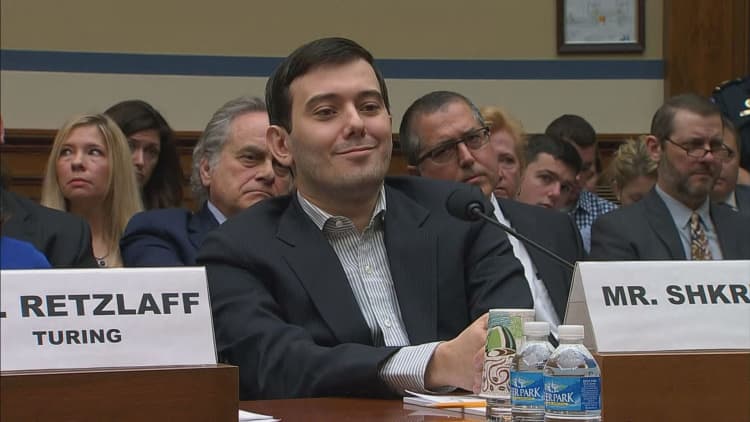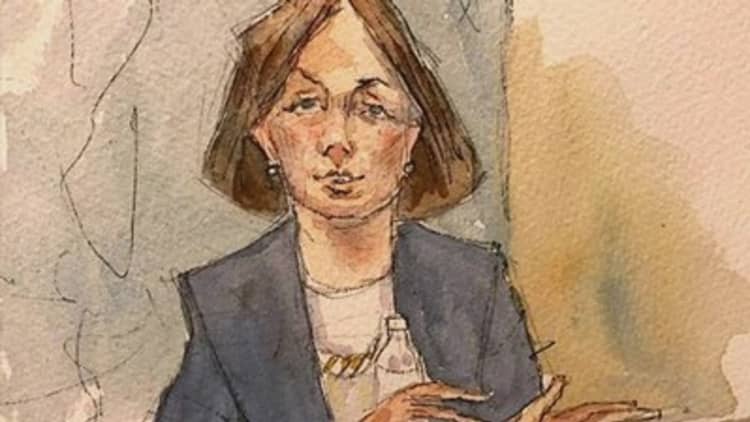
Jurors in the Martin Shkreli securities fraud trial on Tuesday asked their first substantive questions to a judge during deliberations, focusing on the size of the assets the "pharma bro" handled.
Jurors also asked Judge Kiyo Matsumoto for clarity about the term "fraudulent intent."
Shkreli's lawyer Benjamin Brafman was smiling broadly in the courtroom in Brooklyn, NY, federal court when he silently read the note containing the questions.
As Brafman then leaned over to tell Shkreli what it said, he appeared to be mouthing the words "this is a great note" or is "good news."
Brafman had argued strongly in his closing statement last week that Shkreli lacked criminal intent in actions that are the subject of the criminal charges in the case.
The question of whether the note was in fact good news for the defense remains to be seen.
Jurors ended their second day of deliberations on Tuesday afternoon without reaching a verdict, and without querying the judge about any further evidence or legal issues.
The jury sent out the note just before 2 p.m., about five hours after beginning discussions about a verdict. The only prior they had sent was late Monday, when they asked when they were expected to recess for the day.
Matsumoto read the note out loud in the courtroom after prosecutors and defense lawyers were handed copies of it.

Jurors asked the judge for a legal definition of the investment term "assets under management."
They also asked whether such a term refers to the assets in "a particular fund being discussed or to all the assets managed by the portfolio manager/general partner."
That question could be crucial because Shkreli had told the investors he is accused of defrauding that either one of his two hedge funds had anywhere between $30 million and $100 million in assets under management, depending on to whom he was speaking and when he was doing so.
In reality, evidence has shown, the two funds at their peak did not have much more than $3 million apiece in assets, and most of the time had much less than that.
Shkreli's lawyer Benjamin Brafman noted to Mastumoto that Shkreli had told would-be investors that he was also managing the money of a wealthy investor, Josiah Austin. The implication is that Shkreli could have in good faith believed he was managing more than just the money held by his hedge funds when he solicited new investments.
But Matsumoto told jurors in response to their question that there was no legal definition of assets under management that was introduced during the trial.
The judge also said that the question of what Shkreli intended when he talked about assets under management to investors, the Securities and Exchange Commission and alleged co-conspirators "is an issue in dispute for you to resolve."
In their third question, jurors asked Matsumoto, "Can you expand or elaborate your definition of fraudulent intent?"
Brafman suggested to jurors in closing arguments that Shkreli lacked criminal intent in connection with the conduct for which he is charged, and thus should be found not guilty of charges that include securities fraud, and conspiracy to commit securities and wire fraud.
Prosecutors say he defrauded hedge-fund investors by lying about the amount of money he had under management, and by misleading them about the returns he was making on their money with his stock-trading strategy.
Prosecutors also claim he looted the drug company he founded, Retrophin, out of stock and cash to repay hedge-fund investors their money, which he had either lost or used to capitalize Retrophin, without their knowledge.
Brafman, in his closing arguments, suggested that Shkreli did not in his mind intend to defraud the investors, and did all he could to turn Retrophin into a success so that he could make good on his promise to handle the investors' money well.
Matsumoto, in answering the jurors' question about intent, referred them to specific pages in the legal instructions that she read them after closing arguments last week.
After hearing about the note, Shkreli looked at a copy of a biography about legendary investor Warren Buffett that he had been toting around Tuesday. The 1995 book, "Buffett: The Making of An American Capitalist," was written by Roger Lowenstein, a former Wall Street Journal reporter.
"How ... improbable," Lowenstein wrote CNBC in an email when asked about Shkreli's choice of his tome during jury deliberations.
Shkreli also spent time playing cards in the courthouse cafeteria Tuesday while jurors huddled over his fate.
Lowenstein said he believed his book noted some fatherly advice Buffett gave one of his sons: "It takes 20 years to build a reputation and five minutes to ruin it. If you think about that, you'll do things differently."
By "differently," Lowenstein said, Buffett meant doing things "more carefully, especially when it comes to avoiding cutting corners."
"Advice we could all benefit from, the defendant included," Lowenstein said.
Shkreli has a dismal reputation with the general public — and has been accused in a federal criminal indictment of cutting a whole bunch of corners when it came to investors and Retrophin.
The Manhattan resident first gained national attention in 2015 when the company he was running at that time, Turing Pharmaceuticals, raised the price of the anti-parasite drug Daraprim by more than 5,000 percent. Daraprim is used to treat toxoplasmosis, a condition found in pregnant women, infants and people with HIV.
"This isn't the greedy drug company trying to gouge patients, it is us trying to stay in business," Shkreli told The New York Times that year. "This is still one of the smallest pharmaceutical products in the world. ... It really doesn't make sense to get any criticism for this."
But Shkreli got a ton of criticism from patient groups, presidential candidates Hillary Clinton and Donald Trump, and members of Congress.
Despite his initial defense of the drug price being raised to $750 per pill from $13.50 per pill, he soon said he would lower the price. However, Daraprim's price reportedly was $375 per pill for many patients in 2016, and the drug price comparison site GoodRx says Daraprim can cost almost $49,000 for a 60-pill bottle at some pharmacies.
Turing, which Shkreli left as CEO in 2015 after his arrest on fraud charges, offers financial assistance programs to some people who use Daraprim, who under certain conditions have to personally pay nothing or at most $10 for the drug.
WATCH: Co-worker says Shkreli 'mentally unstable'



